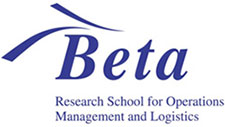On Thursday, July 4, 2019, Sjors Jansen will defend his PhD thesis “Quantitative Models for Stochastic Project Planning”. This thesis has been supervised by prof.dr. A.G. de Kok, prof.dr.ir. I.J.B.F. Adan and dr. Z. Atan. The ceremony will take place in room 0.710 of the Atlas building, Eindhoven University of Technology at 16:00 hrs.
Abstract
Projects are a collection of tasks that need to be executed to achieve a specific goal, for example manufacturing a product. In order to achieve this goal, resources such as capital, workforce and equipment are required. The execution of projects is subject to uncertainties. Costs can be higher than expected, durations can be longer than expected and so on. We cannot mitigate these uncertainties, projects are uncertain in nature. However, in order to help decision making we can develop mathematical models that consider these uncertainties. In this thesis we focus on the development of stochastic models that take into account several types of uncertainties in project planning.
In the first part we focus on project planning with uncertain durations of individual tasks. We develop models for manufacturing systems where low volume, capital intensive and customer specific products are produced. Examples are airplanes or lithography machines. Because of these characteristics we consider each product as a separate project instead of using a traditional production control approach. The goal of these project is to deliver the machine on time to the customer at minimal cost. In the minimization problem, we balance cost for being early for a deadline and penalty cost, the cost for being late at a deadline. We derive optimality equations and show that these have a Newsvendor shape. We show that the more value an activity adds, the higher the probability that it causes the system to be late.
In the second part of the thesis we develop models for the pharmaceutical industry. This industry faces the uncertainty of go/ no go decisions in projects. Instead of assuming that the complete project is executed, we assume that projects can be terminated early. For these companies it is key to optimize the usage of their drug research capacity, by selecting drug projects from a portfolio. We model this problem as a Markov Decision Process and characterize optimal policies.
